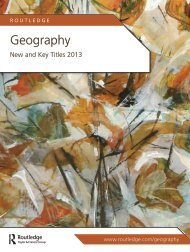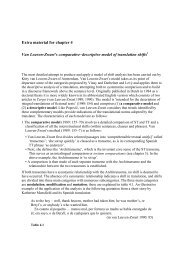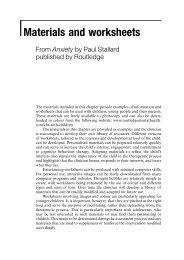Politics and International Relations 2011 (UK) - Routledge
Politics and International Relations 2011 (UK) - Routledge
Politics and International Relations 2011 (UK) - Routledge
You also want an ePaper? Increase the reach of your titles
YUMPU automatically turns print PDFs into web optimized ePapers that Google loves.
ForthcomiNg<br />
The European union’s New<br />
democracies<br />
<strong>Politics</strong> of the Accession States<br />
Karen Henderson, University of Leicester, <strong>UK</strong><br />
The enlargement of the European Union (EU), with the<br />
accession of ten new member states, is probably the<br />
most important moment in its history.<br />
The European Union’s New Democracies is carefully<br />
designed to introduce students to the politics of the<br />
post-communist states which are now part of the EU. It<br />
also explains the political systems of the states of Central<br />
<strong>and</strong> Eastern Europe within the framework of European<br />
integration. Written in an extremely clear <strong>and</strong> accessible<br />
style it:<br />
• provides comprehensive coverage of Hungary, Pol<strong>and</strong>,<br />
Estonia, Latvia, Lithuania, the Czech Republic, Slovakia<br />
<strong>and</strong> Slovenia, as well as Bulgaria, Croatia <strong>and</strong> Romania<br />
• explains the historical background to the transition<br />
process<br />
• compares the political systems, institutions, party<br />
systems <strong>and</strong> constitutions<br />
• examines the conflicts between ’old’ <strong>and</strong> ’new’ Europe<br />
over foreign policy<br />
• analyzes the development of the EU’s enlargement<br />
policy.<br />
Selected Contents: Introduction: Eastern Europe under<br />
Communism 1945-1985 Part 1: The Transition to<br />
democracy, 1985-1992 1. The Fall of Communism 2. The<br />
Course of the ’Revolutions’: Country Studies 3. Redefining<br />
Statehood 4. Constitutional Choices Part 2: The Struggle<br />
to Consolidate democracy, 1993-1998 5. Building<br />
Democracy, 1992-1998 6. Alternation of Government:<br />
Country Studies 7. Economic <strong>and</strong> Social Transformation<br />
8. Building Party Systems Part 3: The Return to Europe,<br />
1999-2004 9. Negotiating with the European Union<br />
10. The New Democracies: Country Studies 11. The Political<br />
Systems of the New Member States 12. The New<br />
Democracies in the Wider Europe. Conclusion: Europe<br />
Reunited. Bibliography. Index<br />
December <strong>2011</strong>: 246 x 174: 288pp<br />
Hb: 978-0-415-33263-7: £75.00<br />
Pb: 978-0-415-33264-4: £19.99<br />
For more information, visit:<br />
www.routledge.com/9780415332644<br />
The End of European<br />
Integration<br />
Anti-Europeanism Examined<br />
Paul Taylor<br />
Series: <strong>Routledge</strong>/UACES Contemporary European<br />
Studies<br />
Written by a leading<br />
international expert on<br />
European integration, this<br />
volume examines the European<br />
Union in a period of hesitation<br />
about future integration in the<br />
early twenty-first century.<br />
2007: 234 x 156: 200pp<br />
Hb: 978-0-415-43105-7: £85.00<br />
Pb: 978-0-415-43106-4: £22.99<br />
eBook: 978-0-203-93568-2<br />
For more information, visit:<br />
www.routledge.com/9780415431064<br />
2nd edition<br />
European union<br />
An Historical <strong>and</strong> Political Survey<br />
Richard McAllister, University of Edinburgh, <strong>UK</strong><br />
The new edition of this<br />
best-selling text provides the<br />
most up-to-date single volume<br />
history of the European Union<br />
from its origins through to the<br />
present day. Fully updated <strong>and</strong><br />
revised throughout, this is the<br />
ideal starting point for students<br />
<strong>and</strong> others wishing to read an<br />
accessible, readable <strong>and</strong><br />
comprehensive account of the<br />
development of the EU.<br />
Topics new to this edition:<br />
• the impact of the Euro <strong>and</strong> economic <strong>and</strong> monetary<br />
union<br />
• analysis of post-9/11 splits in the EU over Afghanistan<br />
<strong>and</strong> Iraq, <strong>and</strong> debates on the new European security<br />
order <strong>and</strong> the threat posed by terrorism<br />
• the enlargement of the EU to 27 members <strong>and</strong><br />
discussions over further expansion<br />
• the initial failure of the EU Constitutional Treaty<br />
• the growth in Euroscepticism across the continent.<br />
An engaging contribution to the underst<strong>and</strong>ing of the<br />
past, present <strong>and</strong> uncertain future of European<br />
integration, European Union is essential reading for all<br />
students of European history, European Union politics,<br />
<strong>and</strong> <strong>International</strong> <strong>Relations</strong>.<br />
2009: 234 x 156: 296pp<br />
Hb: 978-0-415-40762-5: £90.00<br />
Pb: 978-0-415-40761-8: £24.99<br />
eBook: 978-0-203-87569-8<br />
For more information, visit:<br />
www.routledge.com/9780415407618<br />
ForthcomiNg<br />
2nd edition<br />
The <strong>Politics</strong> of the New Germany<br />
Simon Green, University of Birmingham, <strong>UK</strong>,<br />
dan Hough, University of Sussex, <strong>UK</strong> <strong>and</strong><br />
Alister Miskimmon, University of Stirling<br />
Browse <strong>and</strong> order online: www.routledge.com/politics<br />
euroPeAN <strong>Politics</strong><br />
2nd edition<br />
The Origins &<br />
development of the European<br />
union 1945-2008<br />
A History of European Integration<br />
Martin dedman, Baylor University, Texas, USA<br />
The new edition of this<br />
accessible introduction to the<br />
history of the European Union<br />
(EU) has been fully revised <strong>and</strong><br />
updated to reflect the<br />
significant changes within the<br />
EU over the past decade.<br />
Revealing the politics beneath<br />
the surface, national rivalries<br />
<strong>and</strong> changing positions behind<br />
events, meetings <strong>and</strong> treaty<br />
negotiations, the text:<br />
• provides a thematic history of<br />
European economic <strong>and</strong> political integration in its<br />
economic, military, monetary <strong>and</strong> political contexts<br />
• outlines the major schools of thought regarding the<br />
causes <strong>and</strong> motives for European economic integration<br />
including the theories of Lipgens, Haas <strong>and</strong> Milward<br />
• considers the economic <strong>and</strong> political reasons for<br />
establishing supranational organisations<br />
• evaluates the impact of the collapse of communism on<br />
the EU, its policy implications <strong>and</strong> member states’<br />
responses<br />
• contains new <strong>and</strong> updated material on the Euro,<br />
enlargement of the EU, the constitutional debate, EU<br />
economic, monetary <strong>and</strong> foreign policies <strong>and</strong> other key<br />
recent developments.<br />
2009: 234 x 156: 224pp<br />
Hb: 978-0-415-43560-4: £85.00<br />
Pb: 978-0-415-43561-1: £21.99<br />
For more information, visit:<br />
www.routledge.com/9780415435611<br />
’This thematic treatment of contemporary Germany fills a much-needed gap in the student-oriented<br />
literature. The authors have succeeded in producing a fascinating <strong>and</strong> highly accessible account of all the<br />
key issues facing Germany today, making this book a ’must read’ for any undergraduate student of<br />
German <strong>and</strong> European Studies.’ – Paul Cooke, University of Leeds, <strong>UK</strong><br />
’Recommended. All readership levels.’ – CHOICE, October 2008 Vol. 46 No. 02<br />
The <strong>Politics</strong> of the New Germany continues to provide the most comprehensive, authoritative <strong>and</strong> up-to-date<br />
textbook on contemporary German <strong>Politics</strong>. It covers the entire postwar era but has a particular focus on the<br />
post-reunification era.<br />
This 2nd edition has been revised <strong>and</strong> updated throughout <strong>and</strong> features new material on:<br />
• Gr<strong>and</strong> Coalition • Lisbon treaty<br />
• Constitutional Court • financial crisis <strong>and</strong> credit crunch<br />
• reform of social policy • Afghanistan.<br />
Selected Contents: Introduction 1. Germany <strong>and</strong> the Burden of History 2. Germany’s Post-War Development, 1945-1989 3.<br />
Towards German Unity? 4. A Blockaded System of Government? 5. The Party System <strong>and</strong> Electoral Behaviour: The Path to<br />
Stable Instability? 6. Economic Management: The End of the German Model? 7. Citizenship <strong>and</strong> Demographics: A Country of<br />
Immigration? 8. The Reform of the Welfare State? 9. Germany <strong>and</strong> the European Union: A European Germany or a German<br />
Europe? 10. Foreign <strong>and</strong> Security Policy: A New Role for the Twenty-First Century? 11. Conclusion<br />
August <strong>2011</strong>: 246 x 174: 208pp<br />
Hb: 978-0-415-60438-3: £80.00<br />
Pb: 978-0-415-60439-0: £23.99<br />
For more information, visit: www.routledge.com/9780415604390<br />
17
















